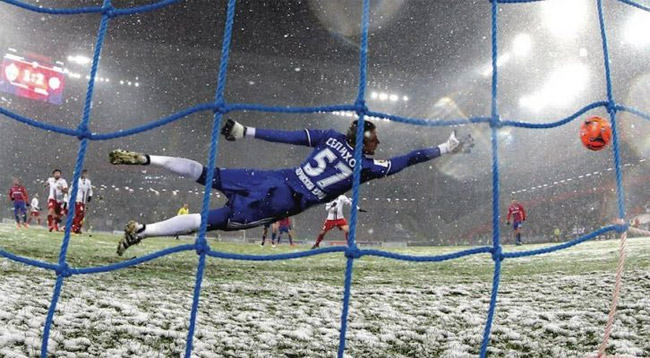The influence of cold weather on the goalkeeper
Goalkeepers who are the least likely to move on the field should be most susceptible and suffer a high risk of injury when playing under the cold weather.

Falling snow makes the ball slippery and difficult to control with the goalkeeper.(Photo: Mikhail Japaridze.)
Cold weather, not only reduces the quality of football matches, but also negatively affects the health of players. Goalkeeper, who does not have to move much in the game, is the position most affected when playing under the cold weather.
According to Weather Affects Soccer, direct impact on the health and performance of the goalkeeper. Under low temperature conditions, players will face hypothermia. The body will need more energy to keep warm, causing the players to wear out faster. Goalkeepers are the least moving people in the game, which means their bodies are the least heated to combat hypothermia compared to other positions on the field.
To cope with the cold, the body will have adaptive reactions such as goose bumps and tremors. Besides, hypothermia also causes the muscles inside the body to receive less blood and oxygen, leading to reduced motor ability. This makes the goalie reflect more slowly and lacks precision, significantly affecting the performance.
Cold weather also makes the muscles less elastic and elastic, increasing the risk of injury to the players in general and the goalkeeper in particular.
Things get worse with the goalkeeper in snowy conditions, because the ball becomes slippery and harder to control, making it difficult for goalkeepers to catch the ball. One study has shown that, in the cold weather of 0 ° C, the goal keeper's penalty kick was 7% lower than the normal temperature.
- Bac Bo was sunk in cold weather, Hanoi 14 degrees Celsius
- Welcoming the cold air, the North is about to end the hot sun
- Pick up cold air, Bac Bo cold transfer, low temperature
- Cold air rushed to the North
- America is so cold that sharks have to freeze to death
- Cold air strengthened, the North was cold
- Weather forecast 4/5: Cold air, this afternoon in the North shower
- Cold air rushed in, the North transferred rain from tonight
- The North continued to drizzle, the South was warm
- Cold air affects many parts of the North
- The south continued to be cold and full of fog
- The North continues to maintain cold weather and small rain
 Green tea cleans teeth better than mouthwash?
Green tea cleans teeth better than mouthwash? Death kiss: This is why you should not let anyone kiss your baby's lips
Death kiss: This is why you should not let anyone kiss your baby's lips What is salmonellosis?
What is salmonellosis? Caution should be exercised when using aloe vera through eating and drinking
Caution should be exercised when using aloe vera through eating and drinking